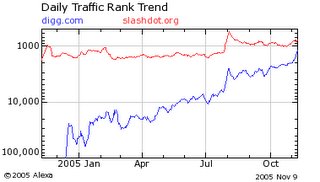We recently covered the phenomenon called digg. Digg started with the notion of how to leverage the collective mass of the Internet in various ways: applying it to content, using it to rank content, using it to make content more palatable to the masses. Automated systems take time to crawl the net. Editorial systems have the human factor. They may decide they're not interested that day, or they'll do it tomorrow. 
In Digg’s case, there's no barrier. The larger the critical mass of users and the collective wisdom applied to digg, the better and more relevant the stories get. Alex Bosworth writing about the Digg phenomenon finds an interesting ecosystem at play behind the scenes. 
There are five groups of people who make digg.com what it is.
- Readers : an educated guess would be that probably ten to twenty percent of those ever click 'digg', they are mostly just there for the end product of the digg machine: an array of interesting news and links often presented before the other news sources.
- Diggers: some percentage of the readers, probably ten to twenty percent. They bother to vote for the stories on digg.com, which changes the numbers next to the stories and enables stories to get to another queue - the diggnation podcast.
- Hardcore diggers : people who sit in the queue of submitted stories and watch for breaking news that should make its way up to the front page, or report stories as being spam or irrelevant.
- Submitters: people who post fresh stories. It's difficult to post a fresh story to digg at this point, it's a competition for who can submit it first.
- News publishers : often bloggers who want to get readership for their content.
The really interesting about these groups is that each of them is required for the system to function, they all came together relatively quickly, and each of them have different and complementary rewards for what they do. That’s how the power of user generated content and economy of people is exemplified by Digg. Without these people, digg would cease to function: nothing would make it out of the link queue. Overall, with blog publishers creating content they want dugg, submitters scouring the net for stories they can add to their 'published on the homepage' list, digg queuer watchers looking for cool links before anyone else has seen them, and digg readers reaping the benefits and creating a powerful digg.com frontpage readership, digg has come a long way very quickly. As digg tries to go into other fields to live up to their venture valuation, such as perhaps political news, general news, or more innovative areas, it will be interesting to see if they can keep this same ecosystem going or if they have to try to invent new dynamics.
As an aside - look at the two charts comparing traffic between Digg and Slashdot taken in a gap of few weeks – Don’t be confused – they are on different logarithmic scales and therefore look different – Earlier we have seen that statistics can lie and perhaps now pictures can also mislead – at first sight!!
Category :Emerging Trends, Digg
|

